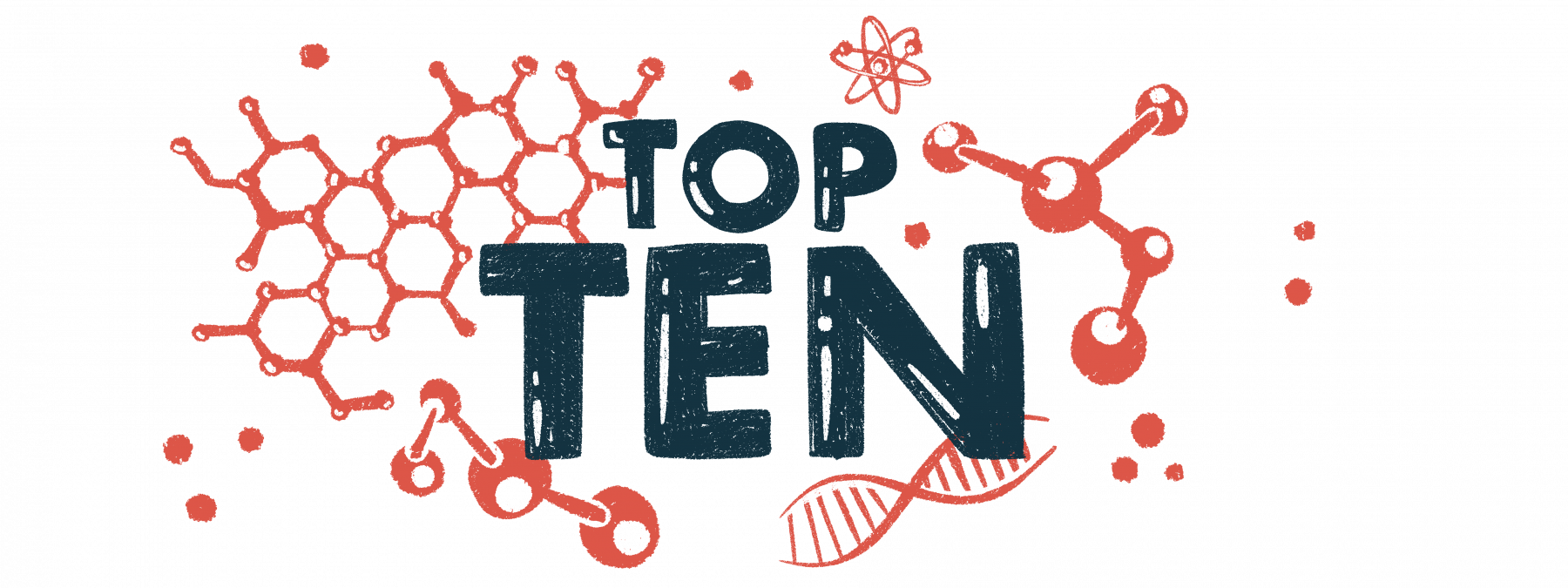Top 10 Pompe disease stories of 2023
Coverage ran from work in gene therapy to Pombiliti + Opfolda's approval
Written by |

Throughout 2023, Pompe Disease News brought you coverage of the latest developments in research into Pompe disease and clinical trials of potential new treatments.
Here is a list of the 10 most-read stories we published across that year. We hope to continue being a source of information and assistance to the Pompe community in 2024.
No. 10 – Trial of gene therapy AT845 restarts after hold
Astellas Gene Therapies announced in January that the FORTIS clinical trial (NCT04174105) of its gene therapy candidate was restarting, with the hold placed on the study by the U.S. Food and Drug Administration (FDA) in 2022 having been lifted. The trial, which is testing the therapy, AT845, in adults with late-onset Pompe disease (LOPD), was placed on hold after a patient developed a type of nerve damage.
AT845 aims to deliver a healthy version of the GAA gene, whose mutations cause Pompe disease, to muscle cells, leading to greater production of a working acid alpha-glucosidase (GAA) enzyme. FORTIS, a Phase 1/2 trial, still may be recruiting eligible adults with LOPD at sites in the U.S. and U.K.
No. 9 – Antibodies against enzyme replacement therapies don’t reduce efficacy
Nearly a quarter of adult LOPD patients develop antibodies against enzyme replacement therapy (ERT) — but that doesn’t necessarily mean the therapy will stop being effective, researchers found. A decline in ERT efficacy was seen in only a minority of patients with high levels of these antibodies.
Enzyme replacement therapy is a standard Pompe treatment that deliver a working version of the GAA enzyme that’s deficient in Pompe. Results from this study were similar to findings of an earlier study in children with Pompe disease.
No. 8 – Teen with LOPD develops antibodies to Lumizyme decade later
Researchers described the case of a boy with LOPD who developed antibodies against the ERT Lumizyme (alglucosidase alfa) after more than 11 years on the treatment. At the time he developed these antibodies, starting at age 13, he had a notable worsening of muscle weakness and a decline in lung function.
Immune-modulating treatments were effective for reducing the anti-ERT antibodies, and the teenager’s physical function notably improved once his antibody levels dropped.
No. 7 – Pombiliti + Opfolda start heading toward approval
Toward the start of the year, Amicus Therapeutics announced that it was expecting U.S. and U.K. regulators to decide on whether to approve its combination treatment of cipaglucosidase alfa and miglustat, then known as AT-GAA, to treat LOPD.
The therapy, which consists of a lab-made form of the GAA enzyme alongside an enzyme stabilizer, would ultimately be approved in both countries under the brand name Pombiliti + Opfolda.
No. 6 – Blood stem cell gene therapy approach shows promise in mice
Scientists tested in a mouse model of Pompe disease a gene therapy approach based on stem cells — called hematopoietic stem cells (HSCs) — that make new blood cells. In this approach, HSCs are engineered to produce a working version of the GAA enzyme with a molecular tag that helps to bring the enzyme into muscle cells. Results showed that the treatment normalized the expression of hundreds of muscle proteins, previously at altered levels, in the mice.
Previous work in a mouse disease model also indicated that the gene therapy can prevent the toxic buildup of the sugar molecule glycogen in Pompe muscle cells.
No. 5 – Substrate reduction therapy well tolerated in healthy volunteers
A Phase 1 clinical trial of oral MZE001 in healthy volunteers found the potential treatment to be well tolerated, with no serious side effects reported, and with a potential to lower glycogen levels as designed.
Being developed by Maze Therapeutics, MZE001 is a substrate reduction therapy that aims to decrease production of glycogen, the sugar molecule that builds to toxic levels in Pompe due to reduced functionality of the GAA enzyme.
No. 4 – Amicus chairman and Pompe father expresses pride at new treatment
In a November interview with Pompe Disease News, John Crowley, the executive chairman of Amicus, expressed his personal pride at bringing Pombiliti + Opfolda to market as the third approved treatment for Pompe disease, a condition that affects two of his children. Crowley also discussed Amicus’ plans for the future, including research into potential gene therapies for Pompe.
No. 3 – FDA approves Pombiliti + Opfolda for certain adults with LOPD
The FDA approved Pombiliti plus Opfolda in September to treat adults with LOPD who are not improving on their current ERT. The U.S. decision came soon after similar approvals in the U.K. and the European Union.
Pombiliti, given as intravenous, or into-the-vein, infusions, is an ERT designed to deliver a lab-made version of the GAA enzyme patients’ lack, particularly in muscle cells. Oral Opfolda is a chaperone protein that stabilizes the enzyme so it stays active in the body longer.
No. 2 – Gene therapy effective for Pompe disease in mouse model
In a mouse model of Pompe disease, researchers tested the effects of a gene therapy that aims to deliver a working version of the GAA gene to the body’s cells. This gene therapy was developed using a vector designed by Amicus. Results showed that the gene therapy cleared glycogen, increased GAA enzyme activity, and restored muscle function in the mice.
No. 1 – Brain structures appear to be altered in infantile-onset Pompe
In analyses of MRI data from a dozen patients with classic infantile Pompe disease, researchers found evidence of microscopic damage to certain brain structures. However, these structures, in certain brain regions, appeared normal in 18 people with LOPD.
While researchers cautioned that it’s impossible to draw broad conclusions from this single and small study, they said their findings may help to better understand how Pompe affects brain development.
All of us at Pompe Disease News wish our readers health and happiness in the new year.


